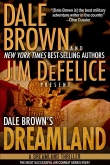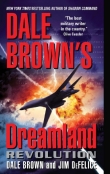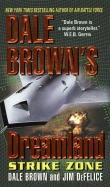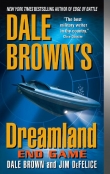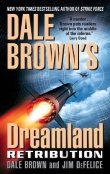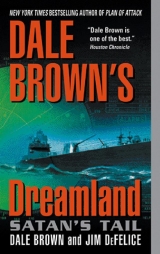
Текст книги "Satan's Tail"
Автор книги: Dale Brown
Жанр:
Боевики
сообщить о нарушении
Текущая страница: 14 (всего у книги 22 страниц)
Was that what Ford wanted?
You couldn’t fault the ambassador for wanting to make a strong message, thought Jed, and here it was, all in an easily disseminated jpg file: We have to stop these pirates. They’re blowing up the world’s oil supply.
And they were too. The message wasn’t a lie. They were SATAN’S TAIL
249
blowing up whatever they could, killing as many people as they could in the process.
Unfortunately, Jed Barclay didn’t happen to have a picture of it.
Except for a phony one. Kind of artistic, though. And definitely dramatic.
His sat phone began to ring. He picked it up and turned it on.
“Mr. Barclay, stand by for Colonel Bastian.”
Before he could say anything, Colonel Bastian’s voice boomed onto the line.
“Thanks for helping us out on that situation today. What are the odds on us using that facility again?”
“Yeah, OK,” said Jed. “The Navy, um, mentioned that you’re supposed to work through them.”
“Did I get you in trouble?”
“Not yet.”
“We could use a base a lot closer to the gulf. Somewhere in Africa.”
“I’ve tried, Colonel. No go.”
“What about India?”
“Boss is opposed to that for a bunch of reasons,” Jed told Dog.
There was a knock on the door.
“Your lunch is here, sir,” said a voice in the hall.
“OK, cool,” said Jed. “Just leave it. Uh, Colonel, I gotta run.”
“All right. If you can arrange for us to use that base again as a backup, though, I’d appreciate it.”
“I’ll work on it.”
He ended the call, then pulled over the laptop. He slid his finger on the touchpad and moved the pointer to the X at the top of the corner of the program window.
DO YOU WANT TO SAVE? asked the computer.
He hesitated, then pressed YES.
250
DALE BROWN’S DREAMLAND
Diego Garcia
0400
MACK WAS TOO KEYED-UP AND TOO TIME-LAGGED TO SLEEP.
He read some of the CD-ROM manuals on the Piranha and basic naval warfare tactics. By four a.m. he’d read his fill and was still restless. He pulled on a sweater and roamed out of the building. His wheels splashed through a deep puddle near the road.
“Hold on there,” said an authoritative voice behind him.
Mack turned around and recognized Boston, one of the Whiplash team members.
“Sergeant Rockland. Good morning.”
“Morning, Major. Out for a stroll?”
“A roll more like it.”
“Yeah.” Ben Rockland—Boston to those who knew him—pulled a cigarette out of his jacket pocket. He had an M4 rifle with him, a shortened version of the M16 preferred by airborne and some special operations troops. “Want a butt?”
“No. I didn’t know you smoked.”
“Out in the wilderness, there’s nothing else to do.” Boston lit up and took a drag. “How you doing with that thing?”
“Chair? Pain in the ass. Literally.”
“Yeah.” Boston took a pensive smoke. “My brother is a paraplegic.”
“No shit. Sorry.”
“Yeah. Sucks big-time.”
“It does.”
“You’re gonna be OK, though, right?”
He was. That’s what everybody said. But he sure as hell didn’t feel like he was going to be OK.
“Bet your ass,” said Mack. That was what people wanted to hear.
“Good.” Boston took a long puff on his cigarette. “Well, don’t get run over by a bike. That’s the main means of travel around here.”
SATAN’S TAIL
251
“I don’t think there are too many people going to knock me over at this hour.”
“Probably not.”
“What happened to him?” asked Mack.
“My brother? Car accident.”
“No hope?”
“Nah. People, you know, they tell him to cheer up and shit, but, I mean some days he gives it a good show. He really does. But he ain’t the same person. He played basketball in high school. Not like he was a star or nothing, but I mean, to go from that to this. Sucks.”
“Yeah.”
“You’re going to get better, though.”
Am I, thought Mack. When?
“Hey, you need like a ride somewhere? We have two vehi -
cles. We brought in a pair of gators, you know, the little ATV
things.”
“I don’t really know where I’d go this time of night.”
“Gym’s open. Fitness center. It’s over by the billeting office. Open 24/7. Come on. I’ll just tell Nurse I’m taking you over.”
“Thanks, Sergeant. I appreciate that.”
“You can call me Boston. Everybody does.”
“Thanks, Boston.”
UN Building,
New York City
7 November 1997
1830
THE CORRIDOR SEEMED TO CLOSE IN AROUND JED AS HE
walked with the Secretary of State and the rest of the American entourage toward the chamber where the Security Council meeting was to be held. They were running late; the meeting should have started a half hour ago. But the delay was well worth it. The Secretary had spent the time convinc-
252
DALE BROWN’S DREAMLAND
ing Russia to vote in favor of the proposal. Britain was strongly in favor. China had already agreed to abstain. That left only France among the permanent members that could veto the measure. The French had been presented a draft of the proposal, but the Secretary had not been able to schedule a meeting with them. According to Ford, that wasn’t a bad sign. He predicted that Egypt, one of the rotating Security Council members and a key regional ally, would agree because of pressure from Oman as well as the U.S.
They reached the doorway. There were people ahead, murmuring. The Secretary paused, then swept right. Jed followed, and was suddenly inside the National Security Council hall. Along with the ambassador and Secretary of State, he moved to the U.S. spot at the table. Jed sat in one of the modernistic blue seats directly behind Ambassador Ford.
He’d seen the room on a tour as a kid and vaguely remembered it now—more for Rosie Crowe’s hair than the awe he should have felt. He hadn’t felt any awe at all then.
Now he did.
Security Council President Fernando Berrocal Soto of Costa Rica gaveled the session to order. The murmurs crescendoed and then there was silence.
Secretary of State Hartman leaned forward and began his speech.
“The international community cannot withstand the continued depredations of lawlessness in the Gulf of Aden, which escalate every day,” he read. The words had looked good on paper—they had sounded great when the Secretary tried them out on Jed and some of the staff—but they came off flat here, a little off-key and hurried.
Jed thought of what a nightmare it would be if he had to speak—how terrible his stutter would be.
The ambassador cited some statistics and then spoke of the “horrible outrage” involved in the stealing of the Oman missile ship.
Jed saw the Kenyan representative frowning.
How could he frown? It was an outrage.
SATAN’S TAIL
253
“Would someone dim the lights?” said the Secretary of State, moving to the final stage of the presentation, showing the evidence Jed had compiled.
There was a scramble at the side of the room as the lights were dimmed. They had given a CD-ROM with the presentation to one of the aides, who’d set up a projector and a screen. As the slide show began, Jed heard the ambassador reading the script he’d written, and cringed. He should have done a much better job, he thought, been more eloquent.
He glanced around and saw more frowns; mostly frowns.
Ford was right: He should have gotten more narrative in. He should have used that slide of the ship exploding. No one would have frowned at that.
The lights came back on. The floor moved to the representative from Oman, who deplored the “action of brazen, misguided thieves and radicals.” He called on the international community for action. Ford turned around and gave Jed a thumbs-up.
Then one by one the other permanent and rotating members of the Security Council took the floor. The Kenyan representative charged that the Americans had “wantonly attacked a peaceful air patrol from the law-abiding country of Ethiopia” and “murdered countless airmen aboard the planes.”
Secretary of State Hartman quickly countered that the aircraft had failed to answer hails and acted in support of the pirates. Even the Ethiopian government had denounced their interference with an American flight, he pointed out, claiming that the unit involved had mutinied.
Of course, Jed and the Secretary of State knew that the Ethiopian government actually authorized the mission, but the U.S. had indicated through back channels that it would go along with the lie, so long as no more Ethiopian forces materialized in the area.
Hartman made some points, but Jed saw that Ford had been far too optimistic. Kenya and France were clearly opposed to the measure. Egypt was on the fence. The objec-
254
DALE BROWN’S DREAMLAND
tions being raised seemed ludicrous to Jed; the rule of law had to be preserved, international sovereignty had to be preserved, America was injecting itself where it didn’t belong.
How about the fact that a hundred people had died since the attacks began? And a few hundred thousand dollars extorted? Money that was being used to kill innocent people, not only in Africa, but in faraway places like Brunei.
Do nothing? And let the attacks continue? Let more innocent people die?
Peace was attractive—but it wasn’t the alternative here.
When the French ambassador said he had questions about the attack on the American ship, Ambassador Ford raised his hand and then whispered something to the Secretary of State.
“We can answer those questions,” said Ford when the president of the Security Council acknowledged him. “We invite an open and frank discussion, Mr. President. We will answer any questions about that incident.”
“Where was this attack exactly?” said the French ambassador.
The Secretary of State turned to Jed.
“Like, uh, about twenty miles west of Laasgoray and just outside territorial waters,” whispered Jed.
“Tell them.”
“Me?”
“Go ahead.”
Jed’s throat constricted and he felt his fingers turn ice cold. He leaned forward to the microphone; Ford moved aside.
“The attack took place at approximately forty-seven degrees longitude and just short of thirteen miles from the coast in the Gulf of Aden. I have the GPS point.”
“Very smooth,” replied the Frenchman, smirking. He asked another question, this one about the U.S. forces, which Secretary Hartman took himself.
Ford tugged on Jed’s sleeve and Jed moved back.
“Douceur,” the Frenchman had said. The translator had SATAN’S TAIL
255
rendered it as “smooth,” but Jed, who’d taken four years of French in high school and another two in college, realized that wasn’t a precise translation.
Douceur. What did that mean? Sweetness.
A sweet-tongued lie, seemed to be the sense of the remark.
He listened as the session continued. The Russian representative took the floor and began peppering the Secretary of State with questions about pirate attacks that had been made over the previous months.
This is all BS, thought Jed. The Russian knows the answers to those questions because the Secretary of State gave him a background paper with all the information when they met.
The Secretary did not seem to mind, answering the questions patiently. The tone changed with the next speaker, the representative from the United Kingdom, who gave an im-promptu speech on international law on piracy and the prec-edents for following the pirates into territorial waters when sovereignty was being abused by non-nationals.
As the tone of the remarks from the other countries gradually became more diplomatic—and harder to decipher—Jed’s attention wandered. He saw Ford get up and go over to the French delegate; he came back smiling.
A few minutes later a motion was made for a brief recess for dinner.
“Good work, Jed,” said Ford. “Come on now, we’re on to part two.”
“Part two?” Jed turned to the Secretary of State.
“Press conference,” said the Secretary. “Replay for the Sunday papers and talk shows. Important part of the campaign.”
“Oh,” he mumbled.
“We’ll get you some dinner when we’re done. Don’t worry,” said Ford.
Reporters had packed into the auditorium; TV lights were popping in the back as correspondents did brief pieces that could be used to introduce the small snippet or two they would take from the session. A large desklike 256
DALE BROWN’S DREAMLAND
wooden table sat on the stage at the front. Jed hung back, but Ford prodded him to come sit at the table, where three chairs were set up.
“Time to face the music,” the ambassador joked in a stage whisper.
Jed forced a smile. His fingers were freezing again.
The Secretary repeated the highlights of his speech—much more forcefully this time, Jed thought—then opened the floor to questions. The reporters were more skeptical than the French ambassador had been, one or two even suggesting that the pirates were “liberators” rather than thieves.
Maniacs maybe, thought Jed.
“Jed, maybe you can talk about that Oman ship,” said the Secretary when the reporters pressed for details.
“Uh, sure. It was basically a patrol boat that was being refitted; you know, like updated. That included putting in missiles. That’s where the Exocets came in. They’re ship-to-ship missiles. These were early model missiles, which limited their effectiveness and—”
“I don’t think we need the technical detail,” said Ford, good-naturedly. “Don’t want to get into classified areas.”
The specs were readily available in open source materials—not to mention company brochures—but Jed was only too glad to have a reason to stop talking.
“There’s a rumor that Dreamland was involved,” said one of the reporters, an older man with an Indian accent.
Jed opened his mouth to speak but nothing came out.
“Cat got your tongue?” said the man.
“N-No,” he said. Feeling his tongue start to stutter, he stopped speaking. A weight pressed on his chest. He wanted to slide through the floor.
“We’d have no comment on that,” said the Secretary of State.
“What sort of Navy force was there?” asked a young Asian woman. “The American force? What is it?”
SATAN’S TAIL
257
Ford and Hartman looked at him to answer.
“It’s a small-ship surface warfare force,” said Jed, forcing the words from his mouth.
“Which means what?” asked the reporter.
“Littoral warships.”
He turned and looked to the Secretary of State, hoping to be rescued, but the Secretary simply smiled at him.
“A littoral warship is what?” asked the woman.
The Abner Read had been acknowledged by the Navy several months before, and described as a “frigate-sized vessel optimized for the littoral warfare role.” Jed wasn’t worried about security—he just didn’t want to stutter.
“That would be like—like a destroyer,” he managed. “It’s closer in size to a frigate. You could think of it as a small destroyer for, uh, coastal waters.”
“Like a Coast Guard cutter?”
Jed frowned. “Well, not exactly.”
“Is it from Dreamland?” asked another woman.
“It’s a Navy asset. I—I don’t really know that much about it, to be honest.”
The questions turned back to the resolution, and Jed faded into the background again.
“We have to get back,” said Ambassador Ford finally. He rose, signaling the end of the press conference.
“Will there be copies of your presentation?” asked one of the press people, this one an American.
“Yes, of course,” said Secretary Hartman. “The ambassador’s staff will take care of that.”
Jed followed them out into the hallway.
“Good job, Jed,” said the Secretary. “You ducked the Dreamland question masterfully. A very plausible denial that no doubt will help feed the rumors. Good work.”
“Um, did we want to feed the rumors?”
“The Dreamland people are incredibly popular behind the scenes for risking their lives to stop the war in China,” said Ford. “Do we have those slides?”
258
DALE BROWN’S DREAMLAND
“I didn’t make copies or anything. I can copy the file onto a disk.”
“Let’s do that—copy them off, I’ll have Paul in my office make some copies for them. Here—we’ll go upstairs, you download it or whatever you have to do, and then you go to dinner. I’ll bet you’re hungry.”
“Yes, sir. Is it OK to release it to the press?” Jed asked Secretary Hartman.
“Just copy the presentation and give it to Jake,” said Hartman. “I’ll go through it and release it myself.”
“You did good, kid,” said Ford, slapping him on the back.
“You’re a real pro.”
Gulf of Aden
9 November 1997
0601
THERE WAS NO SURER SIGN THAT ALLAH WAS WITH THEM THAN
this: They had managed to get across the Gulf of Aden and westward to Shaqr¯a on the northern, Yemen side of the gulf without being stopped by the Americans.
To cross more than two hundred miles of open water without being detected by Satan’s Tail required more than skill or luck. Ducking between the traffic on the water, hiding near the coast, racing past places the Americans liked to check: all of this required a certain amount of experience and ability. But surely God’s hand had led them across the water to safety. Surely God himself, the one true and only God, intended him for greater things.
And so, Ali told himself, he must avoid the easy temptation. A small British warship was moving through the gulf not twenty miles away, according to his spies. An air defense destroyer, it had been sent ahead of the screening force assigned to the British aircraft carrier Ark Royal. From the description, Ali had identified it as a Type 42 destroyer. He knew the type very well. It was designed primarily for anti-
SATAN’S TAIL
259
aircraft defense, and its crew trained constantly to fight off aerial attacks. They were not nearly as good at dealing with thrusts from the surface, as the Italians he served with showed. Even a ship as large as a corvette could get close enough to launch torpedoes without being detected: 6.5 kilometers, or roughly four miles. Ali’s boats had the same 12.5-inch torpedoes used in the Italian navy. He would not miss if he attacked.
But if he attacked, he would miss the aircraft carrier, traveling a day and a half behind.
To send the destroyer on ahead seemed to Ali typical of western egos. They were focused on the obvious danger—the Red Sea and the narrow passage at B¯ab al Mandab. The destroyer was both an advance scout and a distant warning system—if aircraft came north from Ethiopia, it would see them long before the carrier.
Of course, sending the ship alone was also a matter of sheer hubris. The British were so full of themselves, so proud of their Ark Royal, that they couldn’t conceive of a danger to the smaller ship. Who would want to strike a puny destroyer when the pride of their fleet was nearby?
He exaggerated. The British probably did not believe anyone would attack the carrier either. It was more likely that the destroyer captain was an arrogant know-it-all who had decided to race his superiors to the gulf. They were all ego-tists, untempered, unhumbled by the knowledge of God’s superiority.
Allah would provide a plan to humble them. Hints of it were poking at the corners of his brain, but it had not revealed itself to him yet.
“We will rest here,” Ali told the crew. “We will take shifts.
As soon as dusk comes, we will cross back and rendezvous with our brothers. Then we will embark on our most glorious campaign.”
The men nodded solemnly.
“I am going below,” he added. “Wake me if there is anything important.”
260
DALE BROWN’S DREAMLAND
Diego Garcia
0900
THE NAVY RAN DIEGO GARCIA. WHILE TO THE AIR FORCE IT
was an emergency way-station for bombers operating in Asia and occasionally the Middle East, to the Navy it was an important telecommunications and support site for units operating in the southern Pacific. The Navy also hosted Defense Information System “assets” there, top secret systems—mostly sophisticated antennas—that obtained data from a number of sources, including satellites and listening posts.
Though small, the base’s amenities included a four-lane bowling alley, a ragged and coral-strewn golf course, and what was supposedly one of the best chief petty officers’
clubs in the world. The Dreamland team was given access to the facilities, including the swimming pool, which opened at 0830 on Sundays. Zen managed to wangle his way in a few minutes early. The cement stairs were so steep, he got out of his chair and climbed up the grass hill while Breanna took the wheelchair up. It wasn’t pretty, but it got the job done.
He swam his morning laps while Breanna sipped a coffee at poolside. They were just getting ready to leave when Mack arrived, pulled up the long flight of steps by a member of the security team who’d been traveling with him.
“You got a pool boy now?” laughed Zen as Mack was wheeled toward the water.
“Lay off,” said Mack.
“Why?”
“Come on, Zen. Time to go,” said Breanna.
Zen pulled himself from the pool, dragging himself across the cement to the wheelchair. “Let’s see you do some laps, gimp boy.”
“Zen, go easy,” said Breanna.
“I’m just encouraging him.”
“No, you’re not.”
“He’s a wimp gimp.”
SATAN’S TAIL
261
“Screw yourself, Stockard. Asshole,” muttered Mack.
“What?” Zen pulled himself up into the chair. Mack looked like he was going to start bawling any minute.
“What’d you say, Smith?”
“Screw yourself.”
“You’re lucky I don’t come over there and give you a real workout.”
“That’s enough, Stockard,” said Breanna, grabbing the back of his wheelchair.
“WHY SHOULDN’T I HARASS HIM? WHY SHOULDN’T I KILL
him?” said Zen as they wheeled back toward their quarters.
“I can’t believe you’re saying that.”
“Doctor’s orders.”
“I doubt he wanted you to harass him.”
“Harass, encourage—he said help motivate. That’s what I’m doing.”
“You’re being damn cruel.”
“Like I don’t have a right to be cruel?”
“No, you don’t.”
“Fuck yourself, Bree.”
She grabbed his chair. “Hey. Don’t you ever say that to me again.”
For the first time in their relationship—for the only time in their relationship—Zen felt an almost overwhelming urge to punch her, to physically hurt his wife. The emotion was so strong that he grabbed the rails of his chair, squeezing them; his body shook and for a moment, for a long moment, he wasn’t sure that he wouldn’t hit her.
He closed his eyes, knowing that he was out of control—knowing that this wasn’t him, that he loved his wife, that he would do anything in the world not to hurt her, that he would rather hurt himself than strike her.
And yet the anger was real too; he couldn’t deny it. He couldn’t deny the rage and wrath, the way his body shook even now. He leaned forward in the chair, breathing slowly through his teeth, gazing at his useless legs.
262
DALE BROWN’S DREAMLAND
He was mad at Mack Smith, not her. Not Breanna.
Why was it Mack who would recover? Why the hell not him?
Why the hell not him?
When Zen raised his head, Breanna was staring at him.
“What?” he demanded.
She pressed her lips together, then turned quickly and walked alone down the path.
Just as well, he thought. Just as well.
Aboard the Abner Read
0800
WHETHER SHE KNEW ANYTHING ABOUT COMPUTERS OR NOT, the Dreamland scientist had the full attention of everyone aboard the Abner Read, even Captain Gale.
Especially the captain. Storm watched the scientist spreading out her laptops and wires at the side of the Tactical Warfare Center while volunteers hauled down equipment from the Osprey.
“See, it was designed to interface into your general warfare bus,” said Jennifer, bending over to retrieve a screw-driver from the canvas tool bag. “It’s not going to work right out of the gate, because your system is not quite to spec, unfortunately. Looks like they put in some workarounds because of bugs they couldn’t decode. But I can hack something together.”
Hack it together. Yes.
“And we can control the Werewolf units from here?”
asked Lieutenant Mathews.
Drool was practically coming out of his mouth.
“From this station, once it’s set up,” said Jennifer. “I’ll have them in the air in a few hours.”
“Where’s the pilot?” asked Storm.
“The lead pilot has the stomach flu. I’m his replacement.”
“No offense, miss, but I’d prefer—”
SATAN’S TAIL
263
“A man?”
“No,” said Storm. He had women on his crew and was not overly sexist.
Overly. In his opinion.
“So?” asked the Dreamlander.
“I’d prefer someone on my crew, if they can be trained. I understood that the computer does most of the work.”
The scientist had set her jaw and was glaring at him. If anything, she looked even more beautiful than before.
“What I mean is, I need someone who’s familiar with the ship, and who can stay on the job if something else goes wrong,” said Storm. “You’re going to be busy making sure our gear is working. I can’t afford to lose the systems in the middle of a battle, or just turn the helicopters off.”
“The computer does most of the work flying the aircraft,”
said Jennifer.
“Then it should be easy to learn, right? I have someone trained in, uh, air-type warfare. He’s an ex-helicopter pilot himself.”
“I can teach him. If it’s an order,” said Jennifer.
Jeez, don’t put it like that, thought Storm.
“Very well. I’d appreciate it,” he told her.
Jennifer bent down to get something else out of the bag.
“It’ll be a while before I’m ready to do that.”
“Take your time, miss. Take your time,” said Storm.
Diego Garcia
1100
STARSHIP DIDN’T RECOGNIZE THE ADDRESS, BUT OPENED THE
e-mail anyway.
LIEUT:
YOU PROBABLY DON’T REMEMBER ME. I GOT YOUR E-MAIL ADDRESS FROM KICK’S SISTER. I AM THEIR MINISTER. OUR CONVERSATION IN THE KITCHEN THAT DAY HAS STAYED WITH ME. YOU SEEM
264
DALE BROWN’S DREAMLAND
TO BE A WANDERING SOUL. I HOPE YOU FIND SOLACE. FOR ME, I’VE
ALWAYS FOUND IT IN THE “GOOD BOOK.”
–REV. GERRY
“Good Book.” The minister had put it in quotes.
All the answers, huh? Starship deleted the message. He’d seen what religion could do in Saudi Arabia.
Immediately, he regretted deleting it. The minister was only trying to be helpful. Not even that: just trying to say better what he had stuttered over earlier. He’d been in that position himself plenty of times.
He ought to send the guy a note back, say thanks or something.
Starship turned from the console in the Dreamland Command Trailer’s communications area.
“Captain Freah?”
“What’s up?”
“I deleted an e-mail by accident. Any way to get it back?”
“Deleted or just read it?”
“Deleted. I wasn’t thinking.”
Danny made a face. “Sorry. The techies have it set up so it doesn’t write to disk as the default for security. If you delete, you don’t get to write it on the disk. There might be some fancy way around it,” added the captain.
“Don’t worry about it. Not worth it,” said Starship, getting up.
Plaza Hotel,
New York City
0900
WHICH PHONE WAS IT?
Jed grabbed at all of them in succession—satellite, encrypted, cell phone, hot line, hotel phone …
He didn’t have a hot line. It was a dream.
Except that a phone really was ringing.
SATAN’S TAIL
265
Jed pushed out from under the covers and grabbed for the phone at the side of the bed. “Jed Barclay.”
“Jed, session vote is set for ten a.m.,” said Ambassador Ford.
“We’ll have a driver in the lobby in five minutes. Room service is on the way up with coffee for you. Get over here, OK?”
“Yes, sir.”
Jed put the phone down and lay back on the bed for a minute. The Plaza was far and away the fanciest hotel he had ever stayed in. The headboard was upholstered, for crying out loud. And room service …
There was a knock on the door. Jed jumped out of bed and walked over—he was wearing sweats and an old T-shirt—then remembered that he had to give a tip. “Just a minute,”
he said, and scrambled over for his wallet on the antique dresser. But when he pulled open the door, the man was gone; there was a full pot of coffee on a table at the side.
This wasn’t a plastic carafe either—it was a silver pot.
He pulled on some clothes, shaved quickly, then went down to the lobby. The driver hadn’t arrived yet. Jed took out his personal cell phone and called his mom in Kansas.
“You’re not going to believe where I am,” he told her as soon as she picked up the phone.
“New York,” she told him. “I saw you last night.”
“You did?”
“At a press conference. You could use a haircut, Jed.”
“Really?”
“At least straighten it out a little.”
“No, I mean you saw me on TV?”
“The Secretary of State did most of the talking. He’s a bit full of himself, that one. But you got a few words in about the ship. And Dreamland.”
“I didn’t say anything about Dreamland,” said Jed.
“Your father wanted to tape it, but by the time he found a tape you were gone. There was a girl who’s going to the national spelling bee from Lincoln.”
“I’m like in a real fancy hotel here,” said Jed.
“Good for you, honey. Did they have silk sheets?”
266
DALE BROWN’S DREAMLAND
“I’m not sure,” said Jed.
“You did pull down the covers, right?”
“Well, yeah. I just don’t know what silk feels like.”
“You would if you slept on it.”
“Maybe it was,” said Jed.
“Who paid for you to stay there? Not the government.”
“No, Ambassador Ford set it all up.”
“You aren’t being paid by lobbyists, are you, Jed? On a junket? You don’t want to get in with those lobbyists.”
“No. They’re just friends, I think.” Ford had made the arrangements. Jed had no idea who was actually paying, just that it wasn’t him.
A tall man in a suit walked into the lobby. He saw Jed and walked over, flashing State Department credentials.
“Gotta go, Ma.”
“Have a good day, honey. And get a haircut!”
“I will.”
THE SECRETARY OF STATE LOOKED AS IF HE HADN’T HAD ANY
sleep; it was likely that he hadn’t. He’d gone back to Ford’s penthouse on the East Side, planning to work the phones as long as necessary. Ford, who probably had gotten as little sleep as the Secretary, was just about flying. According to the ambassador, the French had come around; there would be abstentions, but the measure was going to pass and not be vetoed. It was an important day for the U.S. and the world.
An overstatement, he knew, but his enthusiasm and con-viction were contagious. Jed followed them into the Security Council chamber, holding his laptop bag and some newspapers in one arm and a full cup of coffee in the other. The room seemed almost familiar today, and certainly friendlier.
Jed sat, propping the bag by his chair and unfolding the newspapers onto his lap. He hadn’t had a chance to read them yet.
He nearly dropped his coffee when he glanced at the cover of the Sunday Daily News.
It was his cobbled picture of the tanker on fire.
VII
Friends and Enemies
Aboard the Wisconsin , over the Gulf of Aden
1900
THE SUBMARINE HAD BARELY MOVED SINCE THE LAST PATROL, but now that night was falling, Delaford predicted it would come up to periscope depth, take a look around, then proceed.


